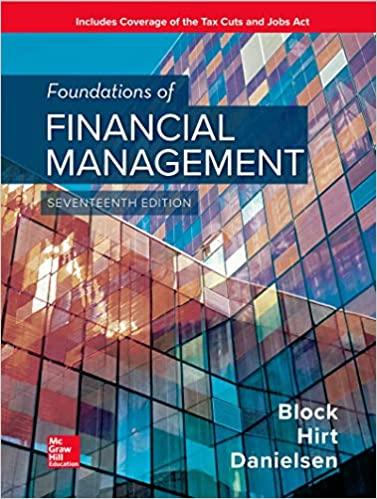Question
Case: Allied Food Products is considering expanding into the fruit juice business with a new fresh lemon juice product. Assume that you were recently hired
Case: Allied Food Products is considering expanding into the fruit juice business with a new fresh lemon juice product. Assume that you were recently hired as assistant to the director of capital budgeting, and you must evaluate the new project. The lemon juice would be produced in an unused building adjacent to Allieds Fort Myers plant; Allied owns the building, which is fully depreciated. The required equipment would cost $250,000, plus an additional $30,000 for shipping and installation. In addition, inventories would rise by $20,000, while accounts payable would increase by $6,000. All of these costs would be incurred at t = 0. By a special ruling, the machinery could be depreciated under the MACRS system as 4-year property. The applicable depreciation rates are 45%, 30%, 15%, and 10%. The project is expected to operate for 4 years, at which time it will be terminated. The cash inflows are assumed to begin 1 year after the project is undertaken (t = 1), and to continue out to t = 4. At the end of the projects life (t = 4), the equipment is expected to have a salvage value of $35,000. Unit sales are expected to total 150,000 units per year, and the expected sales price is $1.50 per unit. Cash operating costs for the project (total operating costs less depreciation) are expected to total 55% of dollar sales. Allieds tax rate is 21%, and its WACC is 11%. Tentatively, the lemon juice project is assumed to be of equal risk to Allieds other assets. You have been asked to evaluate the project and to make a recommendation as to whether it should be accepted or rejected. To guide you in your analysis, your boss gave you the following set of tasks/questions:
Part (E) Assume that you are confident about the estimates of all the variables that affect the cash flows except unit sales. If product acceptance is poor, sales would be only 75,000 units a year, while a strong consumer response would produce sales of 185,000 units. In either case, cash costs would still amount to 55% of revenues. You believe that there is a 25% chance of poor acceptance, a 25% chance of excellent acceptance, and a 50% chance of average acceptance (the base case).
1. What is the worst-case NPV? The best-case NPV?
2. Use the worst-case, most likely case (or base-case), and best-case NPVs with their probabilities of occurrence, to find the projects expected NPV, standard deviation, and coefficient of variation.
Table 2: Allieds Lemon Juice Project Considering 5% Inflation
Step by Step Solution
There are 3 Steps involved in it
Step: 1

Get Instant Access to Expert-Tailored Solutions
See step-by-step solutions with expert insights and AI powered tools for academic success
Step: 2

Step: 3

Ace Your Homework with AI
Get the answers you need in no time with our AI-driven, step-by-step assistance
Get Started


